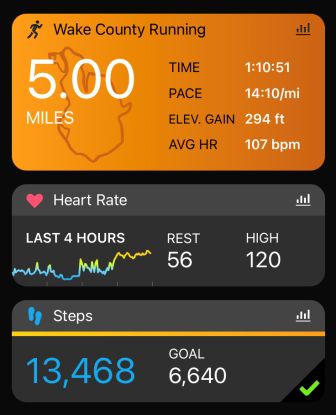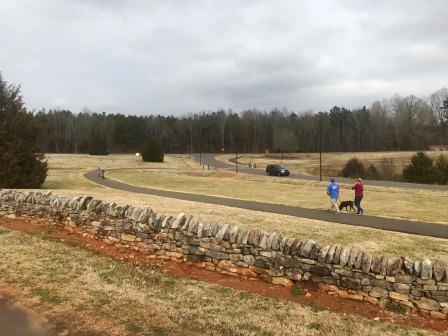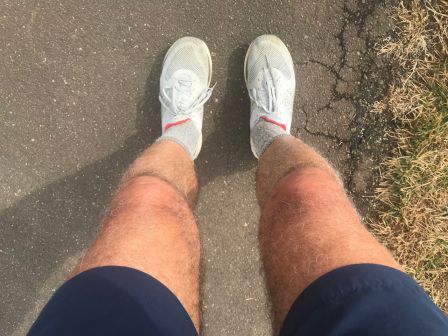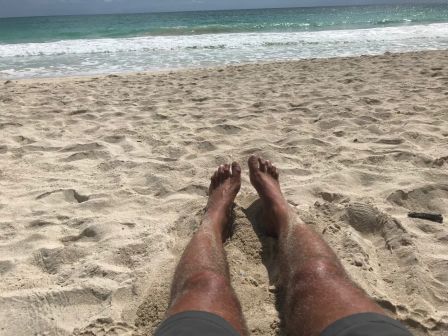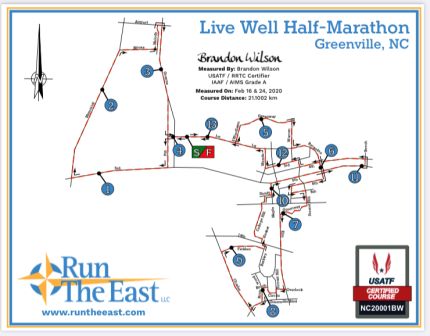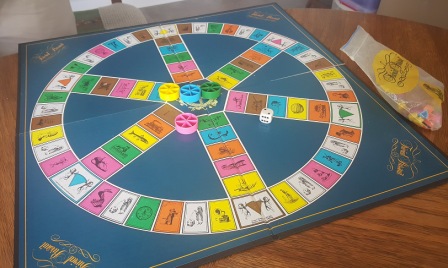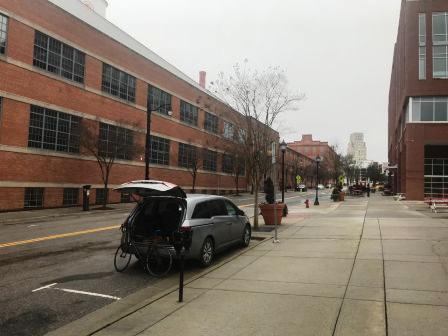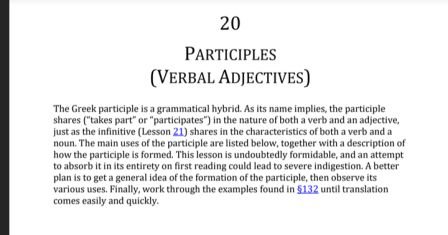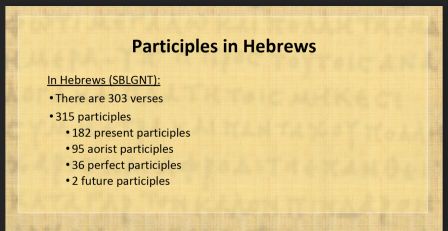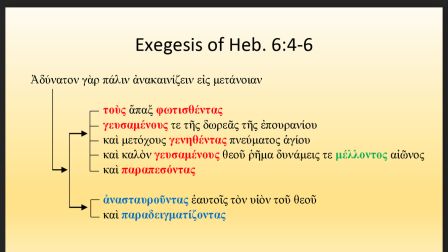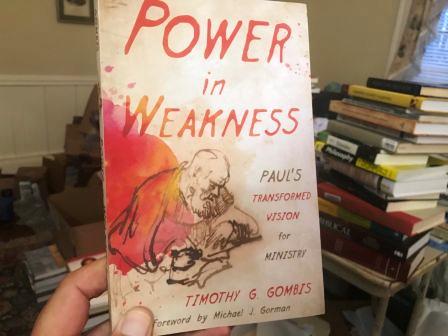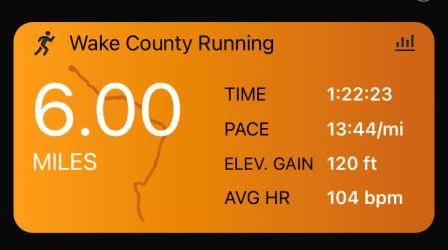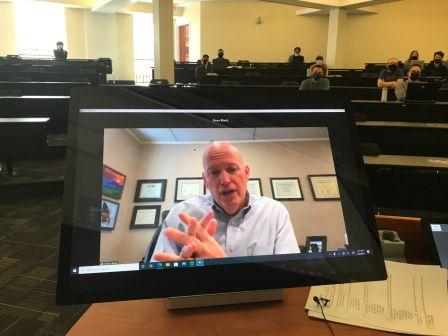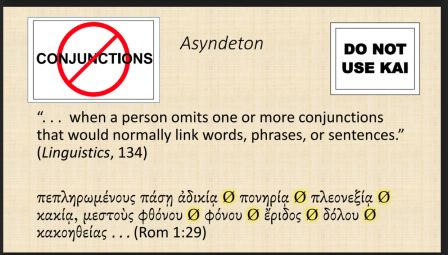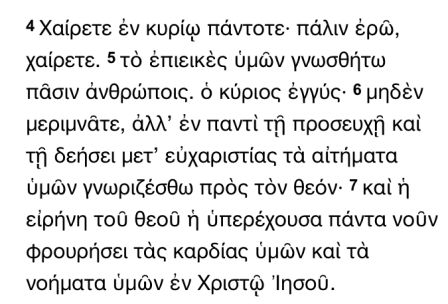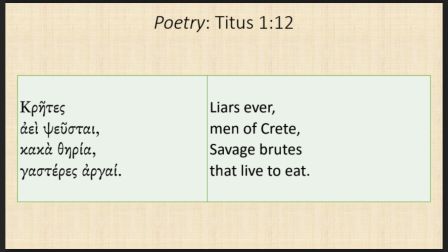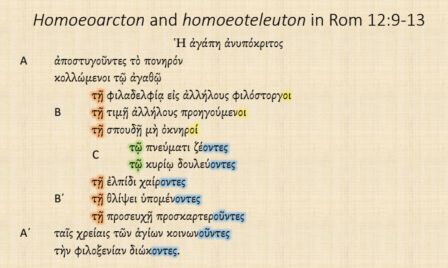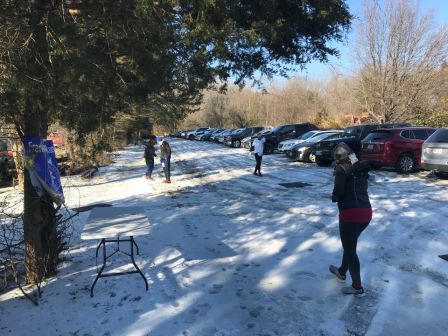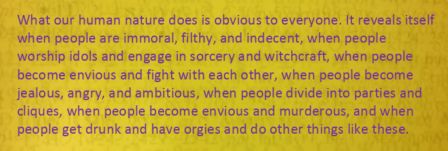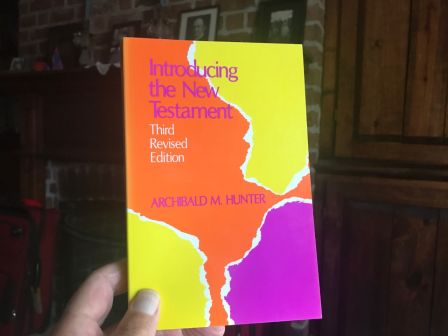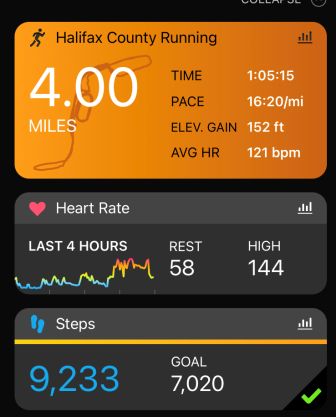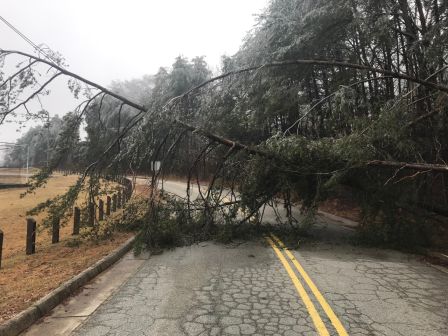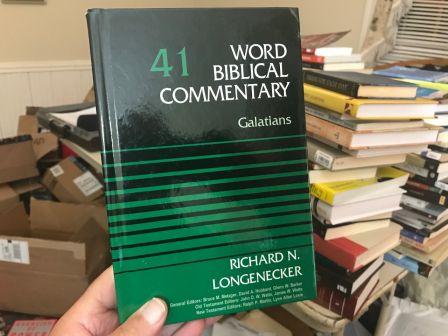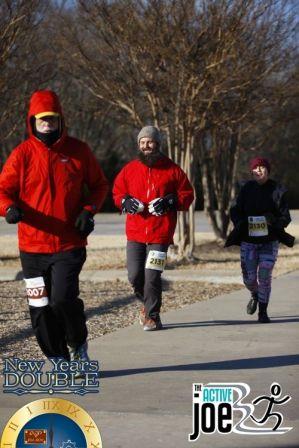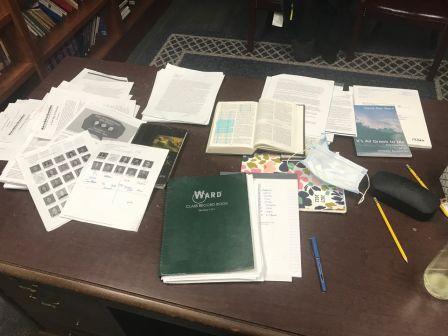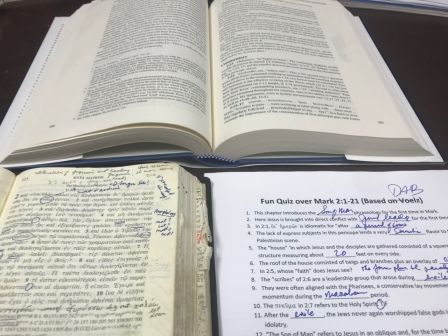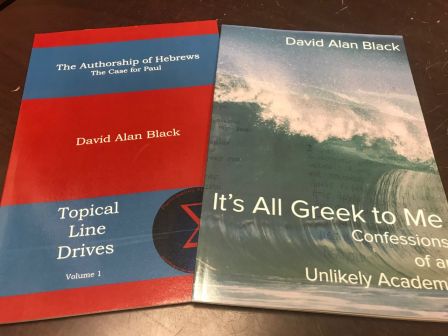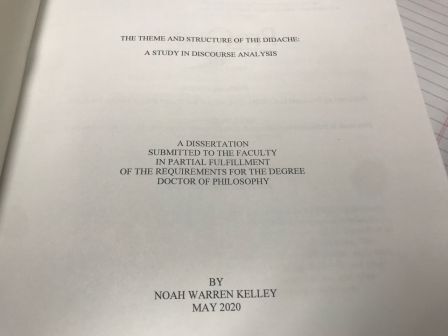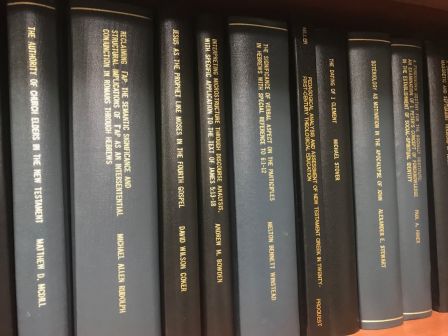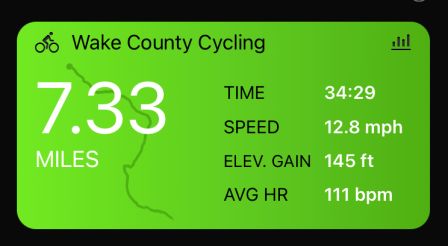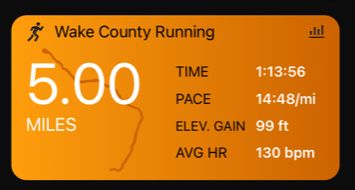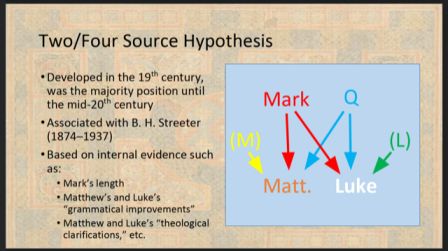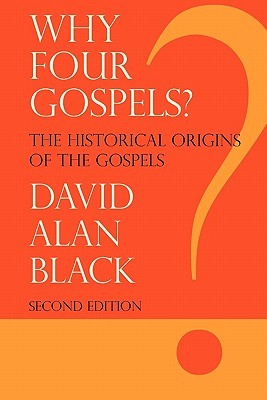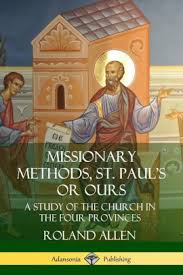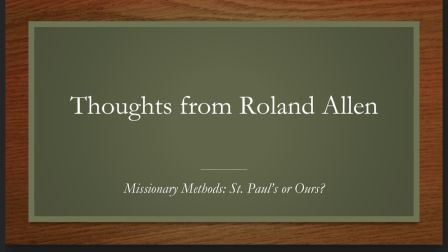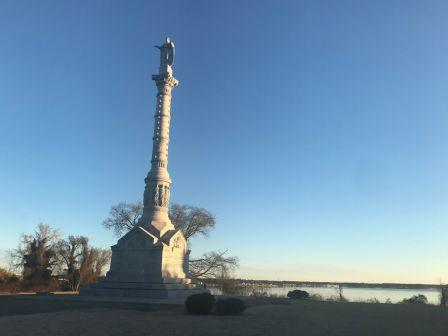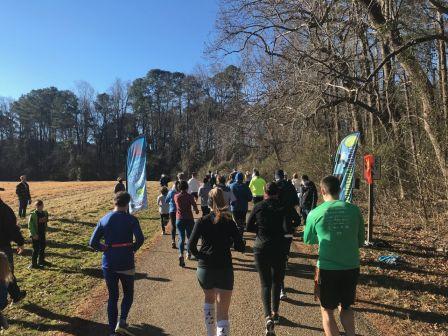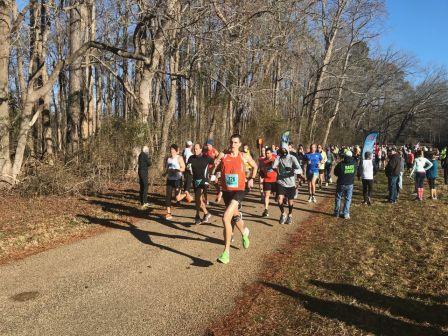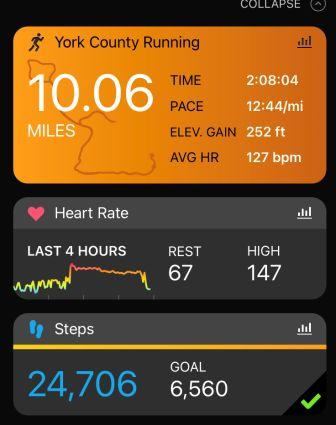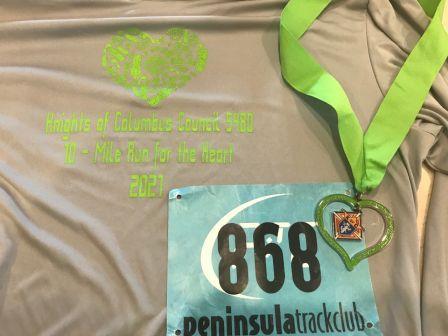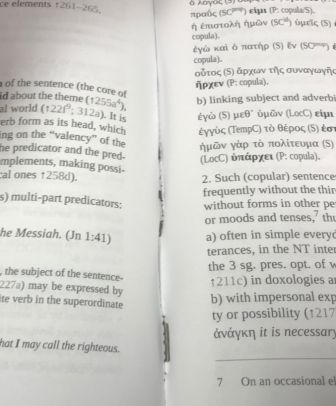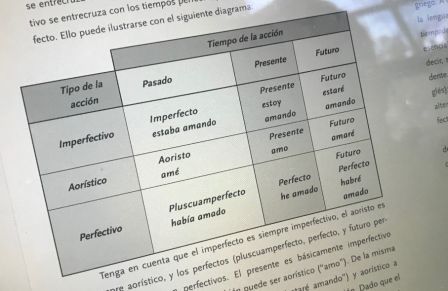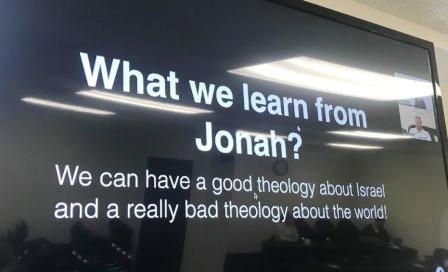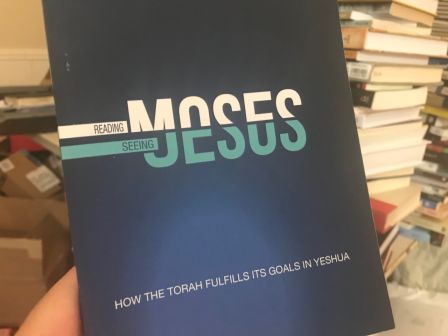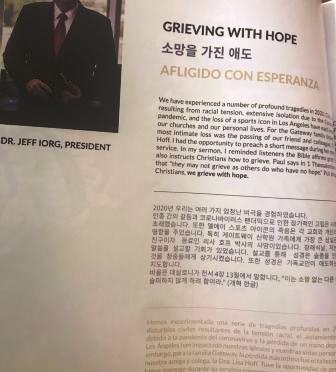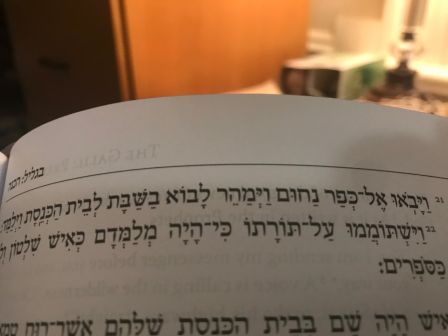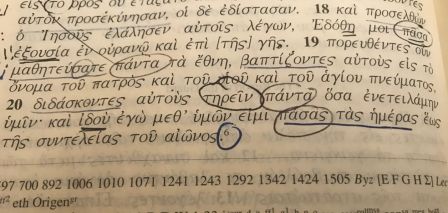October-June 2017 Blog Archives
|
|
|
||||||||
|
February 2021 Blog Archives Sunday, February 28 5:40 PM Anybody up to going to Joyner Park in Wake Forest and running in 72 degree temps in shorts and a tank top? Count me in!
Never did the park look more inviting, and people were everywhere -- well masked and appropriately distanced -- walking their dogs and riding their skateboards and having picnic lunches and shooting off rockets and flying kites and riding scooters and jogging and biking and just plain enjoying life.
On my drive there and during my run I listened to three wonderful messages, one on the book of Revelation, another (by my daughter's husband in Alabama) on the joy of reading the Bible daily, and a third by Chuck Swindoll from Ecclesiastes 3 on how God makes everything beautiful in his time, and that includes "a time to be born" as well as "a time to die," and how we are to let our loved ones go when God takes them home though we are to let grief do its part but to always remember that after grief comes dancing and though we grieve we do not grieve as those who have no hope and how for me God's sovereignty is no longer a mere abstraction and how I thank him every night he got me through that period and how glorious it must have been when Becky was ushered into the bliss and splendor and glory of heaven and then I saw tears begin to stream down my cheeks as I thought of how grateful I am that God gave her 60 years in which to serve him and when I remembered that she accomplished in her lifetime a legacy that will never be forgotten by those who knew and loved her. Solomon's words soothed my soul and gave me peace and how thankful I am for a man like Chuck who can verbalize what so many of us feel and think. Afterwards I treated myself to a plate of pollo at Don Julio's (best Mexican restaurant in town) and turned red when the server complemented me on my Spanish.
Then I drove home to feed the animals and to prepare for a busy week of writing. I was shocked to see how white my legs had become during the winter months ("shark bait" we call it in the islands).
Then I remembered a faraway place in a faraway time where I once had dark skin and could ride the waves and talk DaKine and just be me. Yes, in his time, God does indeed make all things beautiful.
God has never dropped anyone, my friend, and he will not drop you. His grip is unshakable and his hands are strong. He will continue to rescue you from every snare and will carry you safety to his heavenly kingdom. May he be glorified through our lives forever and ever! 8:55 AM Right now I'm fixin' to attend three services in a row. Can't wait! Earlier today I signed up for my next marathon that will take place in two weeks in Greenville, NC. Never been there before but according to the course map it looks like I'll get a grand tour of the city.
By the way, along with the half they are offering a FREE 5K and Fun Run. Go here to sign up. 5:58 AM Wow, the end of yet another month in 2021! Where has the year gone? It's moving along at the speed of light. This year, as I continue to evolve as a person, a father and grandfather, a teacher, and a Christian, I'm sure my blog will evolve as well. But one thing I hope to emphasize as long as the Lord allows me to keep this venue open: The best way to learn the Bible is to give it away. When I teach and share things with others, that's when I really learn those things. If you teach it, you retain it. It's just that simple. Just share with others some truth God has impressed on your heart, and see how that feeds your own soul. So, for the remainder of the year, I hope to go over with you timely biblical truths again and again, like a cow chewing its cud, going over it and over it and over it. When the Lord teaches me something, I'll pass it on to you, and together we will dig into God's word and glean and gain all that the Bible has for us. This morning, for example, I was in Phil. 1:3-11 -- the passage my students in Israel and I will be going over tomorrow. Allow me to paraphrase it for you:
Beloved, this is an apt description of what the church should be all about. The risen Lord himself had promised his disciples divine power to live holy and selfless lives and to witness to his salvation among the nations (Luke 24:48-49). And just think -- in three decades these disciples had brought the gospel from the Holy City to the capital of the world. Remember the game "Trivial Pursuit"? It's a game we used to play as a family.
It's still a game many of us play every day of our lives. It's the pursuit of goals and dreams and ambitions and plans and priorities that aren't eternal. Because of that, it's a game nobody ever wins. Trivial pursuit is that blog post defending your "correct" view about politics, or that defense of "the best" way of learning Greek, or that apology for (or against) home schooling. Trivial pursuit is played every time we spend our time, energy, and thoughts in pursuit of trivial matters. Paul says, "Discern what is best -- what is most important in life. Be done with lesser things. Exchange your 'me first' egotism for 'you first' altruism, like Jesus and Timothy and Epaphroditus did, and you will begin to live a life that's truly worth living." What about it? Are you ready for that kind of a life? Let's pursue it -- together. Saturday, February 27 7:24 PM I'm not fast. I'm also lazy. So why do I run? The main reason is I'm a sucker for causes. That's one of the reasons I signed up for next Saturday's 10K at a place called Loch Lothian (founded by Scots I presume).
As bad a runner as I am, I enjoy raising money. The race proceeds will go to benefit the Intrepid Fallen Heroes Fund. This fund serves military personnel who've been wounded or injured in service to our nation. Last year the proceeds supported the U.S. Army 10th Mountain Division. This year they've chosen the 11th Armored Cavalry ("Black Horse") Regiment. My guess is that nobody actually rides horses in this regiment, but its members still need help. Incidentally, the finish line is in the exact same place as the starting line. Which means we'll be running around in circles. Suits me to a T. 4:22 PM Today I biked a trail that was new to me. I arrived in downtown Durham only to find an empty city.
But after I began my ride I met more and more people out for their daily run or ride. The trail is called the American Tobacco Trail (ATT).
Tip of the Day: Before trying out a new trail, be sure to check the trail conditions. I thought I could get in at least 20 miles today but the trail was closed for repairs and I ended up with far fewer miles. It was all worth it, however, because I got to enjoy some of my favorite food in the universe.
Yes, ladies and gentlemen, injera b'wat will be in heaven. Meanwhile, here's a sampling of the game "Currently" for what it's worth: Cooking: Dinner tonight will be beef and pork Teriyaki stir fry over rice. I know: I'm stuck in a rut. Working on: My lecture for Monday's Greek class in Israel. We're in Phil. 1:3-11. Few passages in Philippians so clearly telegraph to the audience the theme of the book. Reading: Timothy Gombis' book Paul: A Guide for the Perplexed. Looks like I'm on a Gombis roll right now. Craving: Nestlé milk chocolate bars. I am addicted to those things. Problem is, I'm cutting way back on my chocolate consumption. Hoping: To get back to Hawaii this August to celebrate my retirement. I would also love to start another Greek class on Windward Oahu. Thankful that God doesn't just watch. He directs our steps. Loving: My classes. My students show so much promise. And because we are Christians, our success ought to be gauged not only by academic accomplishments but by our changed lives. Anticipating: Running my 17th marathon this June. Who will join me? Who else loves suffering? It's only 138,336 feet. You can't be a wimp all your life. Watching: On YouTube I've been binge watching videos from the North Shore. Pipeline has never been better. Avoiding: Nattering negativity. Like the plague. 6:05 AM With the rise of computer programs, websites, and online tools, you can do just about any aspect of exegesis well. But to read and interpret participles, well, you'll need to be able to encounter the text for yourself. Greek (as is often said) is a participle-loving language. That's why I am excited to be teaching the participle in my Greek 2 classes when we return from spring break.
To be frank, participles are often the most significant elements in the expression of thought and are key to understanding what an author is trying to say. Therefore, understanding the basic uses of the participle is a key to correct interpretation and application of the New Testament.
Part of the beauty of the Greek language is that the construction of its verbs and participles clearly shows who does the action, when the action happens, and whether the action is marked as being on the main line of the argument or not. By thinking through the participle, new vistas of insight will be opened to you. A good example is the "warning passage" in Heb. 6:4-6, where the shift from the 5 aorist participles to the 2 present tense participles is brilliant.
By the way, I'm so proud of my students for making it to "mile 20" of their Greek "marathon." (My textbook has 26 chapters.) Every marathoner knows that the halfway point in a 26 mile race isn't mile 13. It's mile 20. In other words, you expend the same amount of energy in the last 6 miles of a marathon as you do in the first 20. But it is worth it. You will never regret your study of New Testament Greek. God is going to open a whole new world of understanding to you, and you are going to be so grateful to him. Friday, February 26 5:55 PM It's a tough job but somebody's got to do it.
Tonight I'm reading Timothy Gombis' new book.
Part 1 is called "Paul's Unconverted Ministry." "For Paul," writes Gombis, "image was everything." He refers to Paul's "desire to pursue a social status determined by cultural expectations." Educational accomplishments are a good example. Check out this quote:
He adds:
Gombis isn't against the degree per se of course. What he is critiquing is the fleshly effort to be lifted up above others in the church. Writes Gombis, "As we will see in the next chapter, Paul rejected this approach to constructing his identity and saw it not only as useless, but as an obstacle to genuine identity in Christ." Yes, by all means engage in continuing education, my pastor friend. Then leave your diploma in a drawer somewhere. Ask people to call you "brother John" or just "John." Above all, don't just appear to be competent. Be competent! 3:08 PM Cold days are here again! One of my kids got the fields fertilized just before the rain started.
My job du jour? Cleaning the house and bathing Sheba. Poor girl. She's not a big fan of baths.
Otherwise, I feel lazy. Gonna sit by the fire and chillax with a good book. How 'bout you? 7:22 AM One of the main requirements in Bible study is being able to slow down and really look at what the Scripture is saying. This may sound easy, but in reality most of us get bogged in everything but the Bible. In our Mark class this semester, we've been slowing down -- a lot. We're taking a "deep dive" into the most wonderful piece of literature ever produced -- the Holy Bible. My teaching is really nothing more than a sounding board for my students' own observations and conclusions. I don't want them ending up with a secondhand knowledge of the text. I want them to have a personal encounter with the word and to derive interpretations of Scripture that will transform them into the image of Christ. After the break, we'll be in Mark chapter 4, and I can't wait to get there. Unfortunately, this chapter contains yet another example of what some have called "incorrect grammar." That language makes me a little uncomfortable. I prefer to say that the text may have an "apparent error" and then proceed from there. In fact, in 44 years of teaching, I have yet to find an error in the Bible. In Mark 4:41, one scholar sees one such "error." Here's the Greek text:
And here's the English text.
This scholar has claimed, "In Mark 4:41 we find still another example of incorrect grammar in Mark's use of the singular verb 'hears' [sic] with the preceding compound subject -- 'wind and sea.' Both Matthew and Luke correctly use a plural verb." I will grant that this is an unusual construction. But when I was writing my response to this author, it occurred to me to check out A. T. Robertson's magnificent grammar. It was Robertson who pointed out that this is an example of the so-called "Pindaric construction" in which two subjects are used with a singular verb (p. 97). This also occurs in places like 1 Cor. 15:50, James 5:3, and Rev. 21:16. As Robertson notes, "In classical Greek, the verb in such constructions often agreed with the nearest or most important subject, and this may well be the case here" (p. 98). I wish we scholars spoke more probingly about such grammatical phenomena. Too many times we focus on one set of data and ignore other data. I did this for many years when it came to the Synoptic Problem. I'm sure I'm still guilty of it. Most of us take our fast lives and our fast food for granted. We seldom take a long enough break from our Facebook or Twitter accounts to think about how deep a text of Scripture can be. You want extravagance? I'll give you extravagance. Before you go to bed tonight, read the Bible. Don't just rush through a couple of verses. Really read. While you're at it, thank God for verb tenses and Pindaric constructions and figures of speech. It's all there by virtue of divine inspiration. Thursday, February 25 6:40 PM The sunshine is back! Sunshine is always the best medicine. The trails were calling me again. Here's today's run.
And yesterday's bike.
The days were warm and I could actually work out in a t-shirt. When it's warm I want to get out there as much as I can. Otherwise, this week has been super busy per usual. Though I feel totally "accomplished," I also feel totally exhausted. The good news is I finished a journal article on Tuesday.
It was due March 1 but I always like to be early. I believe the best writing is done from a desire to write and not from an obligation. Still, if you have agreed to write something by such-and-such a date, it's always right to meet your deadlines. Moving on, yesterday I was overjoyed to have my friend Kevin Brown speak in class.
He gets the Speaker of the Year Award for doing such a great job even though he couldn't see his audience. Meanwhile, I'm savoring the time off I get next week for Spring Break. The rains return tomorrow and the nice weather won't return for a few days but I do hope to get in another long bike and run in before next Saturday's 10K in Richmond. Anyway, a fun and adventurous week. Get any lemons this week? Yep, so did I. But we don't have to suck on them. P.S. A sincere "Thank you!" to the anonymous person who paid my restaurant bill Tuesday night and asked my server to give me this note.
Dear Sir/Ma'am: I don't deserve your kindness, but I sure do appreciate it. Monday, February 22 7:20 AM Asyndeton. Gives me a Charlie Horse between the ears every time.
When an author fails to use a conjunction, how are we to understand his or her logic? Does the sentence in question go with what comes before it? After it? Or is it meant to be a stand-alone concept? I was pondering this roadside hazard while reading Philippians last night. Here is Phil. 4:4-7. Paul's injunctions stab the ears:
Notice the words in green: The Lord is near! Why the reminder of the Lord's presence? And why here? I think the answer might have something to do with the word I translated "bighearted." The word can be used to describe a temperament that is even-keeled and well-tempered. A bighearted person doesn't sweat the small stuff. He or she accepts the hand they've been dealt. They don't insist on their own way. They are willing to meet others halfway. They are fair, self-controlled, gentle, and steady. When others freak out, they remain calm. Their whole demeanor says, "God is in control." How can you and I be like that? The Lord is near! When we are tempted to press the panic button, the Lord is right there facing the problem with us. And, since we are never far from his presence, why be anxious? We can take our concerns to him in prayer any time of the day or night. He is as near as the air we breath. Christ offers a haven for the storm-tossed vessel. Even in the midst of trouble, even there, yes, especially there, God is our refuge and our strength. I am going to try and remember that this week when I'm faced with anxieties and struggles, both within myself and with others. Honestly evaluate your life. How do you respond to stress and hassles? Begin working with God to make his "Peace Plan" more evident in you. Sunday, February 21 5:06 PM Marathon training rolls on, folks. Today's key word is recovery. Yes, I did a 4 mile recovery walk today at the High Bridge Trail in Farmville.
It's all about mixing easy days with hard days, ladies and gentlemen. We runners must remain vigilant about how our bodies feel and listen to them whether we are going too hard or too easy in training. Walking that fine line in training is always a challenge. I like to arrive at the starting line as fresh, fit, and healthy as I can be. Especially as I look forward to my next marathon in June, I will be paying special attention to easy and hard rest days. I'll say it up front: I do not enjoy resting. But I know it's necessary. This week on campus is going to be another very busy one. Tomorrow I start my Greek 4 class at the Israel College of the Bible via Zoom. We're studying Greek linguistics as well as the book of Philippians. On Wednesday we're having a guest speaker in my NT 1 class. We're studying the life of Christ and especially the transitions he went through at the ages of 12 and 30. My good friend Kevin Brown, an elder in Wilkesboro, NC, has written a ton on this subject and he will discuss the topic of "rite of passage in church and home" with us. Then on Thursday my NT 2 class will take their first exam of the semester. The feeling of youth arises again in this season of teaching. Wasn't it just yesterday that I entered the classroom at Biola for the first time? This teaching thing never gets old. These 68-year old legs will awake tomorrow to a new day of opportunity, both in terms of training for my next race and in order to carry me to my classes and back again. I love watching thinking in action. I hate it when teachers relieve the student of exploring things for themselves. I regret that I did not discipline my mind at an earlier age. The mind is like a muscle that needs to be exercised. When we make great demands on it, it will grow stronger and stronger and become immensely useful in the hands of God. The undisciplined mind too readily accepts a "correct" response for everything. The disciplined mind resists group think and cookie-cutter thinking. It weighs Scripture in the light of history and asks, "What is the truth here?" May we all be truth-seekers this week and deliberately expose ourselves to people who are smarter and wiser than we are! 7:22 AM I love teaching. I just do. When I began my teaching career in 1976, I made it a top priority to mediate the findings of New Testament scholarship in a simple and untechnical fashion. This remains true today. In our next session in NT 2, I am eager to lead the class in a discussion of how Paul uses rhetorical devices to increase the hitting and drawing -- the impact and appeal -- of his message. One thing he delights in doing is using poetry and songs.
Another thing he does is to make certain words or phrases begin alike and end alike.
He does this to indicate unity and transition of thought in a document in which there was no capitalization, indentation, punctuation, or even spaces between words. One of these passages is the one we're focusing on in NT 2 as we study the book of Romans -- the "Cathedral of Christianity." Here's the assignment due that day:
This is what it means to live life "in Christ." It is a life whose primary principle is selfless love which is the fulfilling of the Law. This is the way the "renewed" Christian walks, with the hope of glory at the journey's end. Read and meditate on Paul's words today. They are truly amazing: When you show love people, don't just pretend to love them. Your love must be completely sincere. You should abhor what is evil. You should hold on tightly to what is good. Since you all belong to the same family, you should love one another affectionately. You should take delight in honoring one another above yourselves. You should never be lazy but always work hard. You should be passionate about everything you do. You should serve the Lord obediently. When you realize how confident your hope in God is, you should be joyful. When you experience trouble, you should endure it patiently. When you pray, you should always expect God to answer you. When God's people are in need, you should always be ready to help them. When strangers need a place to stay overnight, you should welcome them into your home. When people persecute you and cause you to suffer, ask God to bless them. Yes, ask God to bless them. Don't ask him to make something bad happen to them. When people are joyful, you ought to be joyful with them. When people are weeping, you ought to weep with them. You should always live in harmony with one another. You should never think you're more important than other people. Instead, you should be willing to associate with ordinary people. Stop thinking you're smarter than others. When someone does something evil to you, you should not try to pay them back with more evil. You should always be careful to do what is right in the eyes of everyone. You should do everything possible on your part to live peaceably with everybody. My dearest friends, when people mistreat you, you should never take revenge. Instead, leave that to the righteous anger of God. For the Scripture says, "I will take revenge. I will pay them back." This is what the Lord says. Instead, "If your enemies are hungry, give them something to eat. If they're thirsty, give them something to drink. By acting toward them in this surprising way, you will make them burn with shame and maybe even help them change their attitudes and actions." Don't be overcome by evil. Instead, overcome evil by doing good. Saturday, February 20 5:45 PM Just back from the boonies near a bump in the road called Sealston, VA. Today's half marathon was an out-and-back on an old railroad bed -- with ties still in in it! This is the view that met us runners when we arrived at the trail head.
The surface was snow, slush, but mostly a sheet of ice. In a word, the trail was horrible. In two words, really horrible. Knowing we'd be miserable for a couple of hours, the race directors at least thought up some ways of keeping us warm pre-race.
Here's my wave.
Off we went like a herd of turtles.
My main goal today was to stay upright. When the winner started passing me going the other direction I had to come to terms with the fact that I wasn't going to win this thing. At one road crossing, the surface was a skating rink. People were falling on their rear ends galore. Me? I swallowed my pride and crawled across the road on all fours. Yep, that's me. No shame. I finished the race looking like a marionette whose puppeteer had just been electrocuted. I assure you that Frank Shorter couldn't have felt any better receiving his gold medal in the Olympics that I did finishing my first "slip and slide" race. In conclusion, I love runners' conversations. Pre-race:
Post-Race:
I was the guy who said, "Can't wait to do it again!" I'm telling you, I'm not a competitor to be taken lightly, folks. From now on I'm throwing down the gauntlet. Those heavy footsteps you hear behind you could be mine. And if they are, you're in for the race of your life.
Friday, February 19 12:42 PM Hi. It's me again, popping in after a week on campus and after a couple of very dicey (and icy) storms. Was so good to get back to the farm. The animals were glad to see me and I was glad to see them.
I was surprised there wasn't more tree damage than there was.
I mean, this whole week was one long nasty ice event. Finally, I think I see the sun trying to peek out from behind the clouds. Only 15 more weeks to go until my next marathon. Tomorrow I'm supposed to do a half near Fredericksburg but the weather is still kind of iffy. I'm cautiously optimistic. If the race was going to be cancelled I would have heard by now, so I think I'll head on up there and give it a shot. I'm so thankful that the farm never lost power during the ice storms we had and I really feel badly for all those who did lose their electricity. A big tip of the kepi to the brave men and women who worked around the clock to repair the power lines as the storms raged all around us. You're my heroes. Monday, February 15 6:22 AM The main takeaway I got from reading Galatians over the weekend? It's much easier to be saved than to act saved. It takes very little effort to sound spiritual. But being spiritual? That's another story. And just what does a saved person sound like? Well, there's Tommy Theologian -- you know, the guy who's always talking about Calvinism and expository preaching and historic premillennialism and agape love. Being saved is all about what you know. John Stott used to call people like this "tadpoles" -- all head and very little body. Then there's Pat Popular, with his "Praise Gawd" outbursts and holy "Amens!" In Galatians 5-6, Paul offers us a better definition of "saved." He is adamant that Christians show their faith by good (and not evil) living. His list of vices in 5:19-21 is hardly arbitrary. You can see this in my translation:
The opposite is also true: Paul's nine-fold "fruit of the Spirit" goes from descriptions of the mind to human relationships to principles that guide one's conduct. The word "love" controls it all. At some point, we need to unplug from today's propaganda machine that bombards us with the three-letter word "Get!" It is the nature of God to give rather than get. And born-again Christians share that nature. But is the life Paul is describing really possible? He seemed to think so. That's what grace is all about. We have received the opposite of what we deserved. Now it's our turn to pass that grace on to others. We do this through love. What is love? Read 1 Cor. 13. Or Rom. 12:9-21. Or Gal. 5:22-23. Then try writing a few practical applications of your own. For example, you might say, "Love is the kindness my son showed me when I needed my tractor fixed." Or, "Love is the kindness I showed when I brought him and his family lunch the other day." Love is ______. You fill in the blank. On a day-to-day basis, I'm more struck by the little deeds I see in others than their intellectual prowess or their spiritual boisterousness. When I look in the mirror each morning, I think, "Lord, you actually love this person." Indeed he does. He's got big dreams for me. For you as well. And he can spot a cover-up a mile away. P.S. You may have noticed in my rendering of Gal. 5:19-21 the couplet "envious and murderous." The word "murderous" isn't found in some Greek manuscripts. I've argued for its originality here.
This, to me, is a clear-cut case of an accidental omission due to a mistake of the eye. Alas, the Alexandrian Priority position is so entrenched in New Testament studies today that scarcely any attention is paid to the longer reading. My friend Keith Elliott used to call this "The hypnotic effect of Aleph and B." I'm glad to know I'm not the only one concerned about that. I guess that's why I write books and compose essays and produce power points on the subject of textual criticism. The only way to know for sure whether or not "murderous" is original to examine the evidence for yourself. Sunday, February 14 3:52 PM Our quote of the day comes from Archibald Hunter:
Incidentally, this book breaks all the rules of textbook writing. It's short. It's easy to read. It's never boring. And it's filled with quotable quotes. My motto as a writer has always been, "Things can be made simple, but they cannot be made easy." So it is with French verbs, missionary strategy, and life itself. The New Testament cannot be made easy but it can be made simple. Thank God for writers like Hunter. 1:44 PM Well, believe it or not, the power has still not gone off. In fact, the ice has even begun melting in places. I went down to the street to check the road conditions and the roads looked great -- ice aplenty on the trees and bushes but the roads are ice-free.
My legs had been screaming at me all day to get outdoors and do some running, so off I mosied to the local high school to get in a short run.
Occasionally you had to run around an obstacle due to the ice storm, but for the most part my run was uneventful.
While jogging I listened to 4 sermons and otherwise just gelled. Running, I might say, is a retreat, a place to commune with God and myself, a place for psychological and spiritual renewal. Today was no exception. Right now I'm in the kitchen prepping my meals for the week, including some strudel muffins for breakfast and some Chinese stir-fry for dinner.
Lunches usually consist of a sandwich of some sort (usually cheese or tuna). I'm as ready as I can be for my classes this week, so I've been spending time planning my goals for this weekend's race. This will, Lord willing, be half marathon #26. What do I hope to accomplish? At a minimum, I want to run at a pace that will allow me to both enjoy my surroundings and think a bit. Like everyone else out there, I also want to be challenged. Man do I draw inspiration from my fellow runners. America is a sedentary country. The people you see out there cycling or running represent only a very small proportion of the American public. So I love being around people who want to take care of themselves. There's never a question of whether I want to run in a race that's coming up. Only having an injury would reduce me to a spectator. Eventually, after the gun sounds I find a nice slow pace to settle into and relax. There is no need to push harder. The joy is in the running, not in the race results. My goal is to run at a pace that my body tells me is comfortable, somewhere between easy and hard. As with Aesop's famous story about the tortoise and the hare, "slow and steady" is my motto. Having already run a bunch of marathons and half marathons, I can pretty much tell you what will happen at this weekend's race. All of us, whether we are slow or fast, will run the race with all of our might. All around me will be runners engaged in the exact same struggle that I am engaged in, pushing themselves to do their personal best that day. You see, those of us in the back of the pack are just as much to be commended as those out front, maybe even more so. When we runners do our best, we are all equal. I realize that when I pass the 5 mile marker of this 13.1 mile race, the leaders will have already crossed the finish line. They are now comfortably sipping Gatorade and munching on pizza while I still have another hour and a half to run. Behind me are runners who will take even longer than that to finish the race. I am not diminished in the least by those ahead of me or those behind me. We are running against ourselves ultimately. These races are great fun. I love the excitement, the competition, the expending of total effort, all for the reward of simply knowing you did your best that day. Running a half marathon allows ordinary people to do extraordinary things. I am racing at a pace I can live with. I am right at the edge of all I can (or ought to) do. No, I will not receive a trophy. My name will not make the sports news. Yet around me are runners working as hard as I am. That is reward enough. 6:50 AM I've always enjoyed reading the Word Biblical Commentaries. Sure, some volumes are better than others, but Richard Longenecker on Galatians is one of the best. Longenecker, who turns 91 in July, is probably best known for his commentary on Romans in the Eerdmans NIGTC series. But his Galatians commentary is its equal in every way.
In reading a commentary, I always start with the author's preface. It usually tells you everything you need to know about the book you hold in your hands -- the author's approach, why he felt he was justified in writing it and adding to the already bloated publication scene, his presuppositions, etc. Since we are in Galatians this week in NT 2, I thought I'd reread Longenecker's preface to his Galatians commentary. What shocked me was how he and I think alike in so many ways. First, he says he is "always concerned with the history of interpretation -- that is, with how a subject has been treated in the past ...." Second, he wants "to know as much as possible about the circumstances behind the writing and the purposes for which its author wrote." Third, he approaches the letter "asking about its literary structures...." Fourth, he is "concerned with the meaning of words in a text, both as to how particular expressions were used in the day and as to how a given author shaped those expressions for his own purposes." Fifth, he is concerned with "the identification and tracing of similar themes and parallel ways of looking at things in roughly cognate bodies of literature with the hope of spawning fresh interpretive insights. Sixth, he is interested in "the development of thought in the apostolic period and beyond." Finally, he considers "the relevance of the NT for Christian faith and life today." All I can say is, "Ditto." First, I am addicted to what in Europe is called Dogmengeschichte -- the history of doctrine. In fact, in Basel there's an entire department devoted to this subdiscipline. Last week in my NT 1 class, during our discussion of the Synoptic Problem, I spent a considerable amount of time talking about the historical origins of the Markan Priority Hypothesis, my point being that no theory arises in a historical vacuum. Indeed, when one understands the origins of that hypothesis, I believe a case can be made that, from the very beginning, it was a false start, as I try to point out in my book Why Four Gospels? Second, with Longenecker, I like to approach every New Testament writing as an occasional document -- not just the epistles, but the Gospels as well. I assert that the Gospel According to Matthew is a manifesto asserting the right of the Jewish Christian church to exist alongside of and apart from Judaism. It likely originated in Palestine within 10 years of the resurrection and was necessitated by the calumnies being proffered by the Jewish opponents of Jesus. Luke, on the other hand, is a manifesto asserting the right of the Gentile Christian church to exist alongside of and as complete equals to the Jewish Christian church. Hence Matthew is the Gospel of Acts 1-12, while Luke is the Gospel of Acts 13-28. Of course, my historical reconstruction may be totally off. You'll have to read the fathers for yourself to judge that. Third, what isn't there to love about the literary structure of the book you're studying? Longenecker sees a twofold division in Galatians: a Rebuke Section and a Request Section. My own outline differs from that a bit. But without at least discussing the structure of a writing (its forest, if you will), there's really no point in looking at the trees and the tiny saps. Fourth, I find no little pleasure in doing lexical analysis in texts and asking how the author employs those lexemes to accomplish his goal in writing. A good example is the lexeme pherō in Heb. 6:1, a nautical metaphor that seems to have been missed by a good number of commentators (David Allen being a notable exception in the NAC series). Fifth, parallels have always enchanted me. In fact, when we're studying Galatians, it will be helpful to ask how Paul has pursued the same or similar themes elsewhere in his writings (Romans, for example). When I did my orals in Basel, one of my assigned topics was Paul's letter to the Philippians. I prepared diligently. During the exam, however, nothing was asked about Philippians specifically. Instead, a question might have gone something like this: "In Phil. 1:19, Paul speaks of suffering as the rule, not the exception, of Christian living. Where else in his letters does he develop the same theme?" My Ph.D. students know that I'll occasionally do the same thing with them. Sixth, apostolic history forms the basis for several of my writings, including my book Seven Marks of a New Testament Church, where I take a close look at apostolic history to see what a New Testament church looks like. Finally, if you take God seriously, you have to take the life lessons of the New Testament documents seriously as well. The New Testament wasn't given for our information but for our transformation. Exasperating as it can be, applying the text is a must. The only hitch is that you must cock an ear to the Bible and, above the humdrum of life, listen for the gentle whisper calling your name. Saturday, February 13 9:40 AM The trees are coated with ice and there are many power outages in the area, so if you don't hear from me for a while you'll know why. My house is on the very end of the grid so if we lose power if may take a few days to get back online. Today I'm reading through Galatians and having the time of my life. I've asked my class to memorize the two key verses of this letter and you might want to join us -- Gal. 2:20 and Gal. 5:1. There is a battle to be fought daily, ladies and gentlemen, and there is a victory to be won and won continually. When the pressure's on, we need to simply remember that we are crucified with Christ and I myself no longer live. Christ lives in me. And the real life I now have within this body of mine is a result of daily trusting in the Son of God who loved me and gave himself for me. In addition, Christ has made us free. Let's make sure we stay free and don't get all tied up in the chains of legalism. We can take as our motto the words of Alfred Tennyson's Ulysses: "To strive, to seek, to find, and not to yield." That's one reason I love marathons so much. The first time you run a marathon you think you are "combat ready" but you actually have no idea how terrible the combat will be. You are in store for pain and fatigue the likes of which you've never experienced before. But by enduring the 26.2-mile agony, runners achieve strengths and virtues that make it possible for them to continue their pursuit of excellence in all of life. The mastery is never complete, whether you a runner or a Greek student. You never fully succeed. Each day requires new strength -- the strength of our crucified and risen Savior who loves us and still is willing to give himself for us. I tell my students, "Words are cheap." Anybody can claim to love Greek. Aspirations cost nothing. Words must be clothed in actions. When I ran the Allen (Texas) Marathon a couple of years ago, the event was held on New Year's Day. The high temp that day was literally 1 degree Fahrenheit. Out of hundreds of runners who registered for the race, only 44 finished. I was number 43. The entire race I felt like Sisyphus, forever pushing the stone but never arriving at the goal.
Implicit in running is the climbing of seemingly insurmountable mountains. Each of us must have a mountain if we are to truly live, even if it looks to some like a molehill. Every goal must be meaningful. Otherwise it makes no sense to pursue it. Our lives must contain mountains or marathons or something out-of-the-ordinary to provide inspiration. You need something you think yourself to be incapable of. You'd be surprised, my friends, how many such challenges are out there waiting for you. I still can't believe we had 50 people taking my Greek class in a local church a year ago before Covid hit. All that matters is doing whatever it takes to achieve one's personal best. Don't believe for a minute that God is trying to make your life easier. Doing one's absolute best becomes the criterion of success. Running in races has made this whole matter plain to me. The battle becomes me against me, a contest with the part of me that wants to stop. Winning is being able to say, "I didn't quit. When I fell down, I got right back up again." When I finish a race, I often stop and look back to watch the other runners as they cross the finish line. Some of them are in great shape. Others are near exhaustion. But none has done less than their very best. So that's my goal for this week, this semester, this year. In the movie Chariots of Fire, the head of Caius College in Cambridge tells the incoming students, "Let each of you discover where your chance for greatness lies. Seize that chance, and let no power on earth deter you." Dear friend, my hope in writing this daily blog is to inspire you to be all that Christ wants you to be. "This one thing I do," wrote the apostle Paul, not "these 50 things I dabble in." That has not changed, nor have we, since the time of the apostles. Friday, February 12 4:48 PM Eagar to start my Greek 4 class in Israel a week from Monday. In addition to studying Greek linguistics, we're covering the book of Philippians. As I pray for my students, I think of Paul's teaching about prayer in 4:6. First there's the word prayer -- an attitude of general devotion and Godwardness. Then there's supplication -- the act of offering humble words to God as an unworthy supplicant. After that comes requests -- specific petitions. Jesus invites us to pray specifically. It's one thing to pray, "Lord, bless the church in Israel." It's another to pray, "Lord, bless each of my students. Bless them as they go over the study questions for their first quiz. Bless them as they produce their own translations of Phil. 1:1-2. Would you help them find the time and self-discipline it takes to master chapter 1 of my book Linguistics for Students of New Testament Greek? Help us to work well together as teacher and taught, for the blessing of your church in the Holy Land." By the way, when Paul says, "Let your requests be made known to God," he uses the passive voice for a reason. All students of Greek know that the middle and passive voices call attention to the grammatical subject. Paul could have said, "Make your requests known to God." But then the emphasis would have fallen on the verb. By writing "Let your requests be made known to God," he's hinting to us that God is seeking our specific requests. Remember Mary at the wedding in Cana? She didn't say to Jesus, "We need help." She was very specific: "They have no wine." Oh, almost forgot. Paul adds, "with thanksgiving." A heartfelt word of gratitude closes the cycle of prayer. Thank you, Lord, for what you are going to do this semester. Thank you for allowing us the joy and privilege of studying your word together. Thank you for this wonderful report from the dean of the One for Israel Bible College. Thank you.
12:46 PM All runners obsess about the weather. This weekend the weather is going to be cold, rainy, and icy. This weather pattern is supposedly going to characterize the coming week as well. What I'm most concerned about -- in addition to the driving conditions on Monday when I plan to return to campus -- is the weather situation for next Saturday's trail half marathon near Fredericksburg. That's a good week off. Right now they're calling for clear skies and a tempt of around 40 degrees. The race director says that there might be snow on the ground. I'm good with that. It's the ice I'm concerned about. But not to worry. These Scriptures come to mind: 1) "There is no wisdom, no insight, no plan that can succeed against the Lord" (Prov. 21:30). 2) "God does as he pleases with the powers of heaven and the peoples of the earth" (Dan. 4:35). 3) "He sustains all things" (Heb. 1:3). 4) "He is the Creator, who is blessed forever" (Rom. 1:25). 5) "He will keep in perfect peace all those who trust in him, whose thoughts turn often to the Lord" (Isa. 26:3). The weather next weekend will be no surprise to the Lord. It will be as he has ordained. So why worry? Today is the only day I have. May I laugh, listen, learn, love, and lavish affection on him today. With his help, I will do this. 8:25 AM Morning, all. Really enjoyed being in 1 Thessalonians this week. I can't put this letter down. It's Paul's earliest writing, and already it's full of unforgettable triads:
These days I pray more before I enter the classroom. Not long prayers but sincere ones:
The apostle Paul is a great prayer partner. Sometimes I just pray his prayers:
Joy often goes hand in hand with prayer and a grateful spirit, doesn't it? I so desire all three qualities -- joyfulness, prayerfulness, and thankfulness -- to characterize my classes. May every session be an act of gratitude. Every time that we meet, may we all see him moving in small ways that others miss. May we submit every detail of our lives to him. One final triad from 1 Thessalonians.... In 1:2-5, notice how Paul possessed all three of the "marks of a great public speaker" that Aristotle talked about. He had logos -- he had a message. He has pathos -- he connected emotionally with his audience. He had ethos -- his credibility and integrity were unassailable. And why? Because he did all things 1) among them, and 2) for their sake. The Greek is simply: en humin, di' humas. In a sense, God is in the business of changing us from "outsiders" to "insiders," and from people who are self-centered to people who are other-centered. This is the challenge each of us teachers must face daily: Am I really willing to identity with those I serve? Am I really willing to put their needs before my own? For Paul, this meant engaging in physical labor instead of mooching off of the charity of others. He was "one of the gang." Like every other able-bodied adult male in the congregation, he earned his own way. Today I'm switching gears from 1-2 Thessalonians to the book of Galatians -- our topic for next week's class. I just thank God that he delivered me from legalism many years ago. In Christ, I am free -- but only to do what pleases him. If you find yourself toying with compromise this morning, you need to start -- I mean really start -- with taking your freedom in Christ seriously. The only true guide is the word of God. It's our sole navigation map. If you pay attention and study carefully, you'll come out on top. But for today: It's all about being joyful, prayerful, and thankful. I know I say this all the time, but I believe that nothing can change our daily attitude quite like gratitude can. Think right now of all the good things in your life. Be grateful for all of it. Even when you're suffering, whisper, "Thank you, Lord." Expect life to be difficult but don't let it psyche you out. That's one reason I love running so much. I suspect most runners have learned how to accept suffering and hardship. We expect it. And when it comes, we don't let it break us. We remember that suffering is temporary. Now go read the Bible. :-) Thursday, February 11 6:40 PM This and that .... If a cluttered desk is a sign of a cluttered mind, what is an empty desk a sign of?
Prepping for a "fun quiz" over Jim Voelz's commentary on Mark.
The reward for the highest score? A free book.
Always nice to get a bound dissertation from one of my doctoral students.
Proud of all of my Ph.D. grads.
Only two -- count 'em, two! -- workouts this week.
My legs are complaining bitterly.
A little comfort food after a busy week on campus. Oh yeah!
Monday, February 8 5:55 AM On deck this week: 1) In NT 2 we're studying the Thessalonian Epistles, which have been called the "Cinderellas" in Paul's correspondence. They are often overlooked. But at least three lessons emerge from their study:
The American church will have to answer to God for what we did about a lost world. Jesus himself will demand an accounting from what he has given us to invest. What kind of stewards are we being of the blessings he has showered on us? This may well be the question of the hour. (Sermon concluded.) 2) In Greek 4 we'll examine closely the place and purpose of the Byzantine text type (neither primary nor secondary). We will also begin looking carefully at the arguments for Markan based on the supposed "inferiority" of Markan style and diction. 3) In the LXX class, student presentations begin this week. Make us proud, ladies and gentlemen. 4) In NT 1: The Synoptic Problem. You know, "The problem solved is stated here: Our Mark did first of all appear, for Luke and Matthew used him both, but Luke and Matthew, nothing loathe, to add some more used Q for Quelle, and special sources M and L." I think not. 5) Finally, there are my two sections of Greek 1. This week it's all about reviewing the indicative verb. We're 16 weeks into our 26 week marathon. Students, you are doing a wonderful job. Studying Greek is mind-numbingly hard and no one is perfect at it. Just do your best. Somehow, against all odds, it will be enough. Love to all! Dave Sunday, February 7 1:02 PM In NT 1 this week, it's "Synoptic Problem Time." Most scholars hold to Markan Priority. Do I teach that? You bet I do. I also teach every other leading "solution" to the Synoptic Problem.
At the end I will talk about my own.
At no time do I ask my students to agree with me. It's their job to examine the evidence and decide. This is shaping up to be one fun week. 9:15 AM Today I'm putting the final touches on my lectures for the coming week. In my NT 2 class, this is the verse that will be driving one of our lectures.
In essence, Paul is saying that the "pay" he gets from his ministry as a church planter is the privilege of preaching the Good News without charging for it and without claiming his rights in his work for the gospel. I think this principle is especially clearly in his letters to the Thessalonians. Hence we'll take a look at my essay "The Thessalonian Road to Self-Support." We'll do a deep dive into all of the passages in these letters where Paul talks about the necessity and joy of work. What might this look like for you and me? Stay tuned. 8:54 AM Have you read this yet?
It's a Christian classic. My NT 2 students read it for last week's class, then summarized it in a book report. I just finished reading and grading them. Excellent work on their part. If you've never read one of Roland Allen's books, read this one. I promise, you will be inspired and challenged. I personally found at least 5 takeaways from reading it.
There is nothing more powerful than the example of a life lived in accordance with Scripture. Allen's was such a life. His book will help you become more biblical in the way approach missions. 6:24 AM Here's a practical suggestion: Study the Bible one book at a time. Do a deep dive. To study the Bible you don't have to be brilliant but you do have to be a hard worker. This week in my NT 2 class we're going to begin our walk through the Pauline letters, beginning with his earliest writing, 1 Thessalonians. I'm having my students read through the letter in one sitting (just as the original audience would have done). What is important is to search for the letter's structure. Want to get started? If so, here's a short study aid to help you. It would be my joy to walk you through the letter's 18 paragraphs (thought units). Remember to use the ask-seek-knock method. Ask God to speak to you as you read the letter. You're not interested in your ideas but in his. Then seek to discover, with the Spirit's help, the meaning and message of the book. The final step is to knock. Knocking takes you from merely thinking about truth to acting on it. To knock is to stand at the door of heaven and make yourself available to God. If you'd like to see how even the first verse of 1 Thessalonians contains many practical lessons for Christian living, go here. If you long to know God, you must do more than read the Bible. You must study it. How I wish I could have each of you in class with me so I could encourage and support you. I know, however, that it's even more important for you to be in the word yourself. Always use the Bible as your primary source of knowledge about the Bible. Books about the Bible may be helpful, but eventually you will want to take your own look from the inside. Happy Bible study! Saturday, February 6 5:14 PM I'm not a gifted runner, but I do love to run. As you know, I'm full of stories about my running adventures. My family is happy I have this blog so that they don't have to put up with my ramblings in person. Since my blog is peer-reviewed (me!), I can post anything, any time. As I mentioned yesterday, the venue for today's race was the Yorktown Battlefield.
Literally. We ran around the ramparts and redoubts and gun emplacements of that decisive battle of our War for Independence.
No blog report would be complete without me sharing something I've learned, so here's a list: 1) General Cornwallis said he was sick and that was why he didn't personally attend the surrender. Right. The Moore House, where the surrender took place.
Nine-over-nine windows. Nice.
2) There were thousands of German soldiers on each side. (Was this why one of the teenagers at the aid station today called out "Wasser" instead of "Water"?) 3) The British Prime Minister resigned after the British defeat at Yorktown. 4) The siege and battle lasted only 20 days. Compare the Siege of Petersburg during the Civil War, which lasted 10 months. 5) The Brits tried to surrender to our French allies, but the French made them surrender to the Americans. Viva la France! 6) This is the only monument I saw on the battlefield.
Its size indicates the importance of the battle. Thankfully, the rest of the battlefield is preserved in its original pristine (monument-less) condition. I think that deserves some kind of an award or something, especially when you recall that Gettysburg has 1,328 of them. Okay, moving on .... You're probably wanting to know how I did today. Not too bad for a 10 mile race, thank you Lord. Tried to reel in this runner. Never could.
Today's race wasn't just another run-of-the-mill event. It was a national qualifier in the 10 mile distance. Which means there were some pretty hard core dudes (and dudesses) out there today. The event organizers broke the field up into 9 waves, based on your average previous times in the 10 mile distance. I was in corral 8 with these nice people.
Here are the guys in the first wave.
The young man out in front eventually won the race. I don't recall his time but it was significantly faster than mine. Elated! Not my fastest but also not my slowest time. And look at all dem steps.
So what did I do while running? I memorized Scripture from The Living Bible. Here's one passage I worked on. Nails it, wouldn't you agree?
Finally, because you've been sitting there so patiently waiting for this report to be over, I have to say how nice the race t-shirt and medal are.
The little green heart says "10-Mile Run for the Heart." So join me in thanking the race sponsors for not only putting on a dope event but for thinking about the less fortunate among us. I know, I know. I'm a sap for fund-raisers. Friday, February 5 7:22 AM Odds and sods .... 1) My von Siebenthal is already falling apart. Oh dear.
2) This week in Greek 4 we camped out in the wilderness of verbal aspect. Here's a screen shot from my beginning grammar (Spanish edition).
The class debated what terms in Spanish terms would most closely approximate "incomplete," "completed," and "complete." Any thoughts? (We also discussed how to do this in German, as one of my students hails from Austria.) 3) Stan Porter bemoans the demise of the "Greek of the New Testament" seminar at SNTS. It's been hosted for years by my good friends Jim Voelz and Paul Danove. I wasn't at last year's conference in Marburg, but not long ago I read a paper in Jim and Paul's seminar at the annual meeting in Toronto. The Greek seminar will be sorely missed, but I think it will be back. 4) Tomorrow's the big day -- my first race of 2021, Lord willing. It's in Yorktown, VA, and the cause is for cancer research. How neat! I love 10 Milers. It's just about the perfect distance for runners. This race will be a warm-up for my first half marathon of the new year -- the Dahlgren Trail Half Marathon in King George, VA on the 20th of this month. As I sit here typing, the excitement is almost unbearable. In person races are returning! Of course, masks are required before and after the race (I will keep mine on the entire time), the start is staggered, and social distancing will be carefully monitored. Still, a race is a race. Yes, my friends, I need new challenges just as much as you do. The temp is predicted to be a "warm" 40 degrees at race start. Whoop whoop! After finishing the Virginia 10 Miler. This is my attempt to do a non-boring pose.
Thursday, February 4 6:45 PM Hey folks! This week was all about missions, whether we're talking about my Greek classes or my NT classes. We're not called to save the world. Only the Savior can do that. What we are called to do is to be lights in a dark world -- "a light to the nations," just as Israel was called by God to be. I was reminded of that during an excellent Zoom call on Tuesday from Seth Postell, who is dean of the Israel College of the Bible.
His talk about Jonah cut to the chase. I'm convinced that the church as we know it has lost its influence because we have neglected to be all that God wants us to be as salt and light in the world. The world may not want the light, but it desperately needs it. As Seth puts it in his wonderful book, Reading Moses, Seeing Jesus: "Be consumed with Yeshua, not with laws and traditions!"
And note: This Jesus doesn't show favorites. He is no "face receiver" (so the Hebrew and Greek). He is impartial. He loves all, even foreigners. That's why I love it when I see something like this.
It's Gateway Seminary's magazine, which arrived in today's mail. Here the president opens the issue with a word of encouragement and exhortation in three languages -- English, Korean, and Spanish. What a message that sends! When I taught adjunctively for Gateway back in the 90s, their Brea Campus was 90 percent non-Anglo. I thrived in that environment. God's love for all peoples is unsurpassed. The time has come for the people of God to love the same way. My constant prayer for my classes is, "Lord, use us. What more can we do for you?" I'm so grateful to the Lord for all he is doing in the world. I'm so glad he delights in using weak but yielded vessels to spread his Good News throughout the globe. I'm so glad to be on his team. Tuesday, February 2 8:04 AM Do Jesus and his disciples enter "Capernaum" or "Kephar Nahum" (the "Village of Nahum") in Mark 1:21?
Don't you love the details of the Scriptures? Don't you enjoy looking at the fine print? The Bible was written for anyone who wants to know who God is and how they are to live in a way that honors and pleases him. But we need to read it for ourselves in a way that helps us discover what it says, what it means, and how to apply to its truths to our lives. We have to be willing to slow down and really concentrate on what the Bible is saying. In frenetic times like ours, that's not always easy. Don't you sometimes wonder if we're too busy -- even for God? My friend, don't settle for secondhand knowledge about God. Increase daily in your knowledge of our Savior and his ways. Become increasingly aware of the details of the Bible. Become a careful observer of the Scriptures. Remember, it takes effort on our part. My prayer for my Mark class this semester is that each of my students, and all of us together, will know God better as a result of our study together. Better yet, may he help us to put his truths into practice. Monday, February 1 6:22 AM There is grace for the grind. Jesus promises as much. "I am with you each and every day."
There is meaning in the mundane. If we truly believe this, we will be content with all God has for us this week. We will not look for greener grass. We will live in the present more than we live in the past or the future. Because we are grateful people, we will be pleasant to be around. Jesus is moving in small ways and none of them is a mistake. Jesus is with us day after monotonous day. I'm so glad. It takes a lot of grace to handle the ordinary circumstances of life. Thank him today for giving you that grace. |
||||||||
